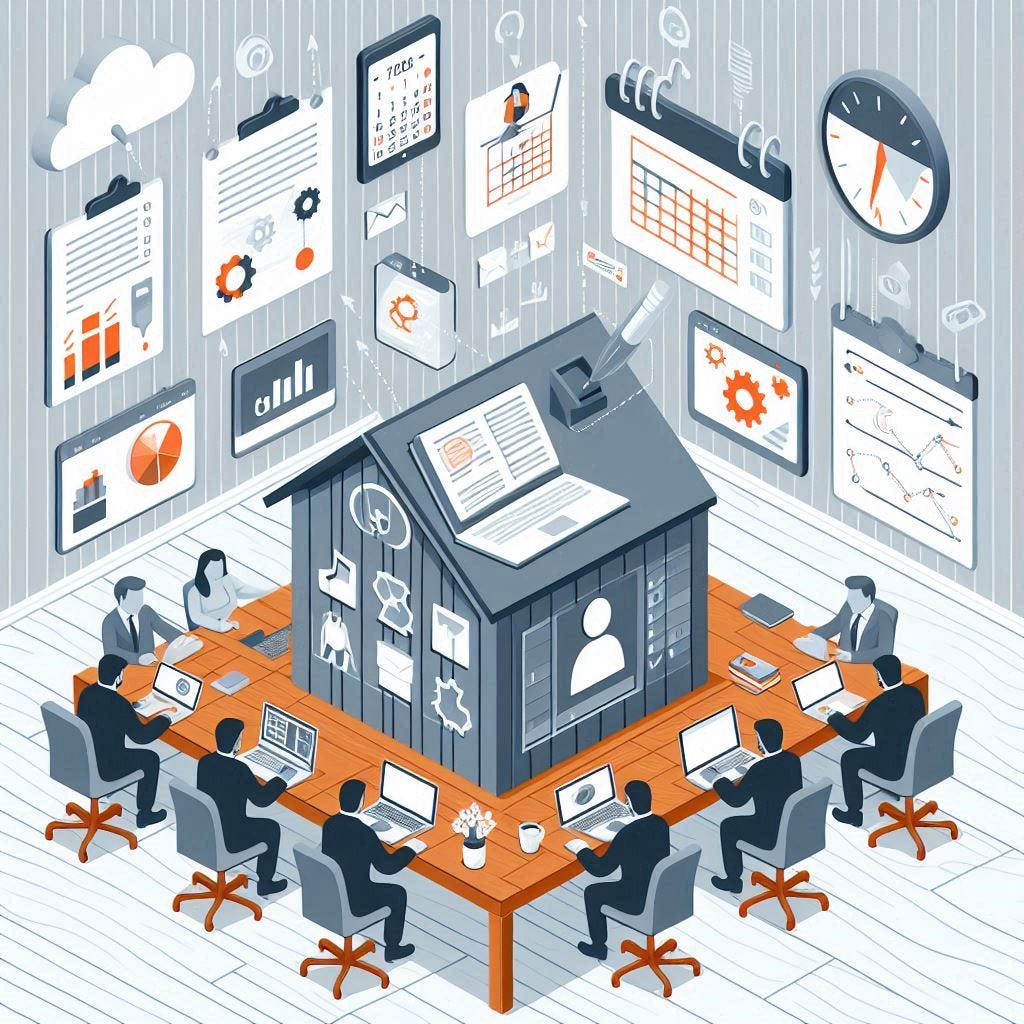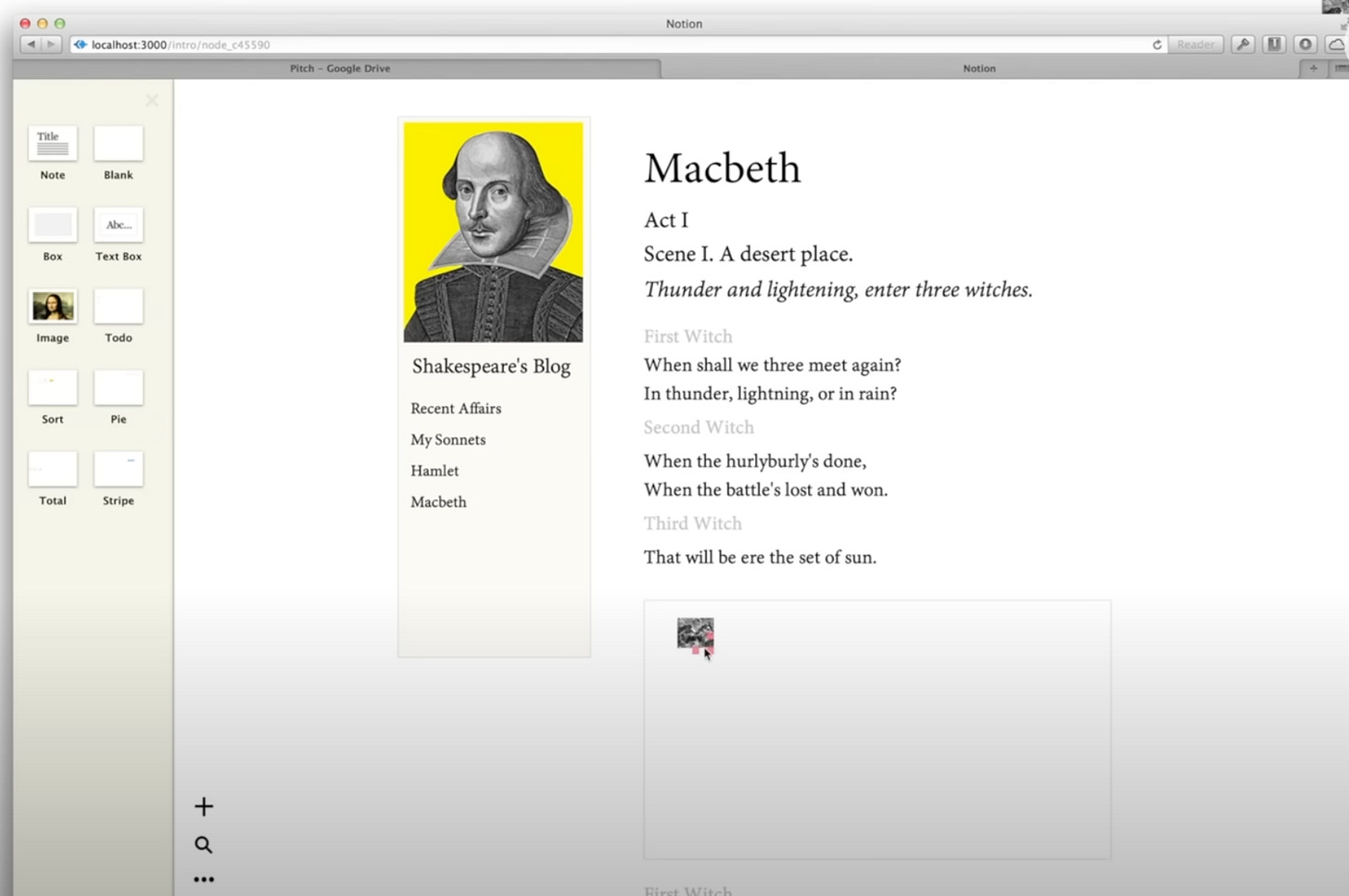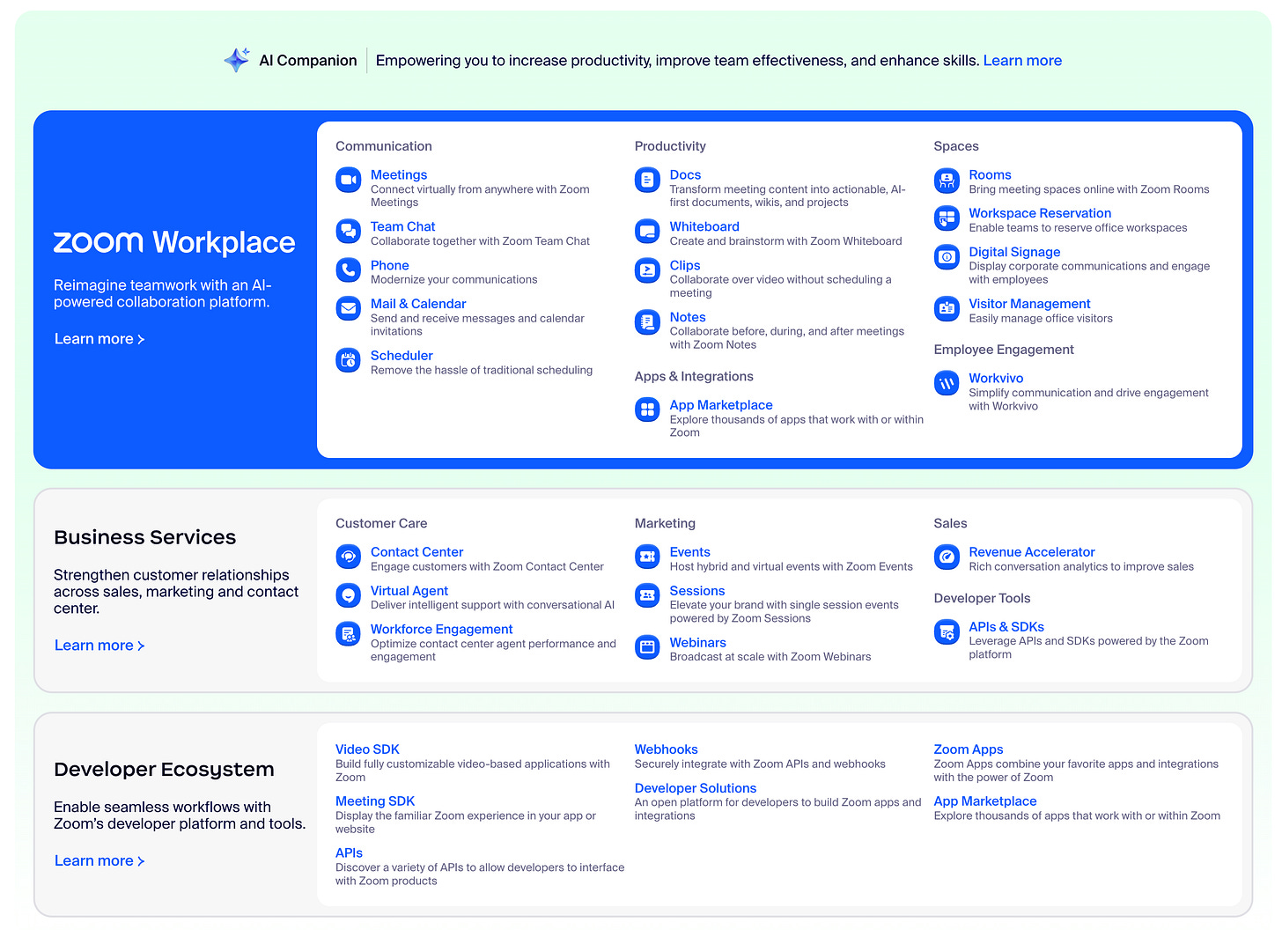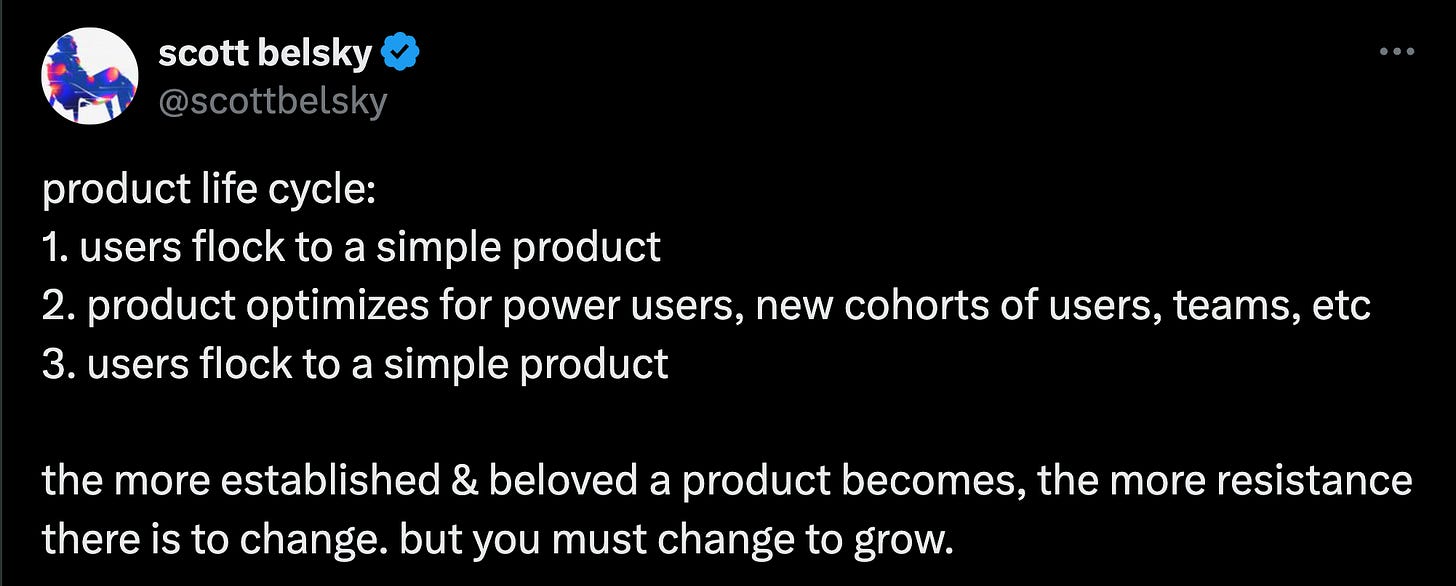Jamie Zawinski is a programer best known for his role in the creation of Netscape and Mozilla. The guy has a law named after him. Zawinski’s law states that:
Every program attempts to expand until it can read mail. Those programs which cannot so expand are replaced by ones which can.
While some interpreted this as software bloating, Zawinski stated:
My point was not about copycats, it was about platformization. Apps that you "live in" all day have pressure to become everything and do everything. An app for editing text becomes an IDE, then an OS. An app for displaying hypertext documents becomes a mail reader, then an OS.
While you are here, let’s look at second-system effect as well:
The second-system effect or second-system syndrome is the tendency of small, elegant, and successful systems to be succeeded by over-engineered, bloated systems, due to inflated expectations and overconfidence.
In the following post we are going to look at Notion, Zoom and Airtable. How they started with a single use case and how they have evolved with time. How the founder’s vision shapes the product’s direction, how much influence does business hold over the roadmap, how business value and user value can be at conflict with each other, and how early adopters of as product might feel left behind as and when a product grows.
Notion
I recently read this post on reddit about Notion mail which sent me down a rabbit hole. Apparently Notion will be introducing mail soon. Interestingly, it is only indexed on Bing. Go to bing.com and search for notion mail and you will see the dev site (as on 17th Sept, 2024).
The comments on the thread were super interesting. While some were optimistic about the possibilities, others were a bit more critical and believed notion should double down on existing features. Either way, I would highly encourage you to go through the entire thread (here and here). Pasting some of the interesting comments below.
If you are viewing this in an email client, then the image gallery feature might not work. Please view the web version here.







Let’s trace the history of Notion. The first iteration of the product was a webpage builder. Then it evolved into a web app builder.
I would recommend checking out these two videos where the founders (Ivan Zhao, Akshay Kothari) talk about their vision: video 1, video 2. If you don’t have time to go through the video, I am copy pasting relevant excerpts here. All text in block quotes is taken directly from the afore mentioned videos.
“Are you building something for yourself or are you building something which the world wants? The first version of Notion was very much what you think the world wants”.
💡Insight
“The challenge is people don’t wake up wanting to build software. People just wake up to do their job.”
“The tipping point for us was when we moved away from asking you to build software to providing you simple templates that allow you to do the job. Now underneath that product all the capabilities still exist. You can still modify it, you can still build your own software, but my marketing to you is less about that and more about specific things you need to do your job and how notion fills that gap.
It is like art combined with technology so it is very intuition driven. It should be so dumb (simple) that you don’t need to pay attention to start picking it up, it feels very natural.
We are not building a CRM, we are not building a specific project management software, but we are giving you all the building blocks. Engineers create the building blocks (legos) and the marketing team creates the templates that market specific use case which makes it a very efficient engine. They just focus on building capability and marketing and other stakeholders build the packaging that we can go out and sell.
The long term mission of the company is to create ubiquitous software tool making which is the simple idea that there are a billion software builders out there and all of them feel the power to modify or create their own software. In doing that we hope that Notion becomes the third generation of productivity software after MS office and G suite. It will be much more powerful in that people will be able to not just take notes and manage projects but will be able to create things that sort of work the way their brain works. It will probably take us more than a decade to get there but we are excited to work on it.”
📝 Paper
Paper is interesting because it is extremely malleable. People can use it for so many different things. It is extremely approachable. We can’t do that with software even today. Software is not that versatile or approachable. How do you make software like paper? Paper is used by children in schools to govt orgs. That is the spirit behind Notion.
Our mission to augment human intellect i.e allow people to create their own software. Then the question is what kind of product is this. Most people don’t want to create software, people want to solve the problem in front of them, use off the shelf software, maybe tinker it down the road. We cannot give people a software building tool, we have to disguise notion as a general purpose productivity software like the document tool, like the spreadsheet, like the project management tracker people use everyday. Once people are familiar with Notion, see it solve their daily problem, then they realize that this notion is built from lego blocks and they can tinker with it just like kids can play around with their lego sets once they get familiar with the initial set. The product with the latter philosophy can directly fit into people’s life a lot more quickly and is more approachable. That’s how we started getting traction.
The idea is further highlighted in Notion’s About page.
The core use case of Notion was documentation (for me at least). Then it introduced databases and further functionality. Let us look at the acquisitions done by Notion in the last few years:
Automate.io: A Hyderabad based iPAAS (Integration platform as a service). Notion acquired it to improve its integration capabilities.
Cron: Cron was a calendar s/w. A direct competitor to Google calendar. Notion acquired it to include the calendar functionality within its suite.
Flowdash: A workflow management software acquired by Notion to improve its project management capabilities.
Skiff: Privacy focused tool offering mail, pages, calendar and digital storage. Skiff will likely give way to Notion mail.
So, if I were to consolidate:
Documentation capabilities: Google docs, MS word alternative
Databases: Sheets, Excel alternative
Calendar (Cron): Google calendar alternative
Mail (upcoming): Gmail, Outlook alternative
Lego s/w: I recently went through Notion’s sub-reddit and found a bunch of templates for trackers and mini apps including but not limited to a medicine tracker, laundry tracker, habit tracker, CRM etc. The possibilities are truly endless and their marketing team has done an excellent job of building a super loyal community. While the engineering team creates lego like functionality, it is the community and marketing team who uses those lego blocks to create use case specific templates/mini apps.
This is a good time to go through the reddit threads hyperlinked above if you haven’t gone through them already.
The story of Coda is very similar to Notion. I personally use Coda for note taking and think it is a fabulous piece of software. In my old org we used to conduct retrospectives on Coda. Everyone would fill a form, and the results were shown in neat visuals. We could compare stats from previous sprints on a graph. The template was created in less than 30 mins. Once you get the initial hang of these tools, they are pretty nifty!
Zoom
They started out as a video conferencing app. In the past year they have released Zoom mail client, calendar, documents, whiteboard, employee engagement s/w; all sprinkled with a dash of AI:-)
Here is what all they offer right now (not an exhaustive list):
Zoom workplace
Video conferencing
Team chat (slack, MS teams alternative)
Mail (Gmail, Outlook alternative)
Calendar and scheduler (Google calendar alternative)
Docs (Google docs, MS docs alternative)
Whiteboarding (Whimsical, Miro alternative)
Clips (Loom alternative)
They even have products tailored for customer success teams (contact centres, AI agents), sales teams (revenue accelerators), HR teams (workforce engagement). An alternate to the likes Apollo, Intercom, HRMS s/w etc.
Let’s look at Zoom’s acquisitions. I will divide the acquisitions into two categories-
Double down on existing video conferencing use case
Keybase: Improve security features
Kites: AI based language translation
Liminal: Events and HD video pipeline
Solve for a new use case
Workvivo: Employee engagement platform.
Solvvy: Conversational AI (chatbots, customer support automation)
In contrast to Notion, Zoom built docs, mail client, calendar natively.
If a customer is already using Zoom for video conferencing, it is easy for them to upsell the next product. If you look at their pricing, a lot of these products come as a part of the workplace bundle. They can also be purchased individually as separate add ons.
Zawinski’s law seems to be holding true for Notion and Zoom 🤷♂️
Airtable
Airtable started out as a mashup between spreadsheets and databases.
Their insight was that spreadsheets are used for a plethora of use cases like managing a guest list, attendance, budgeting etc. In my old org, our roadmap existed on a spreadsheet 🫠. Despite of the versatility of the spreadsheet, it was never created for these use cases. Originally it was created for enterprises, later on everyone started to use it for everything under the sun.
“Spreadsheets are really optimized for numerical analysis and financial calculations. But almost 90% of spreadsheets don’t have formulas. Most are used for organizing purposes.” — Howie Liu, founder, Airtable
“We’re seeing people using our tools in ways we never could have imagined—preserving ancient languages, tracking scientific equipment, managing construction projects, and even planning a U.S. presidential campaign.” — The Airtable blog, June 2015
Airtable’s earliest version had a grid based layout. It was often dubbed as excel on steroids. Do check out this article if you want to go deeper into Airtable’s history.
Despite of starting out as a spreadsheet alternative they went through a revamp and are now positioning themselves as a no code builder which can do everything. This is how Airtable’s homepage looks (notice how their marketing pitch is different from Notion despite pursuing the same end goal).
Platformization is the common theme across the three companies. Purely from a business perspective, a single use case is not defensible enough. Some might even say it is inevitable (especially for funded companies). But, somehow on the path towards solving for more and more, you loose out on the initial set of loyal users.
There is a version of Pareto principle which states that 80% of the users will use 20% of the features. However those 20% features are different for everyone (because the needs of users are so diverse), thus leading to platformization.
Only time will tell how things will pan out in the future. My guess is Notion might even release a chat product akin to slack/teams in an year or two. Until next time, adios 👋.
Related content:
I recently wrote this piece on build vs buy. You might want to check it out. There buy meant s/w subscriptions for white labeled product and not acquisitions per se but the core premise still holds true.
Remember how Notion bought automate.io to strengthen its integration capabilities. Airtable (in 2015) instead used Zapier’s APIs to integrate with external apps. Although it unlocked a lot of new use cases, it also created an external dependency and a single point of failure.











